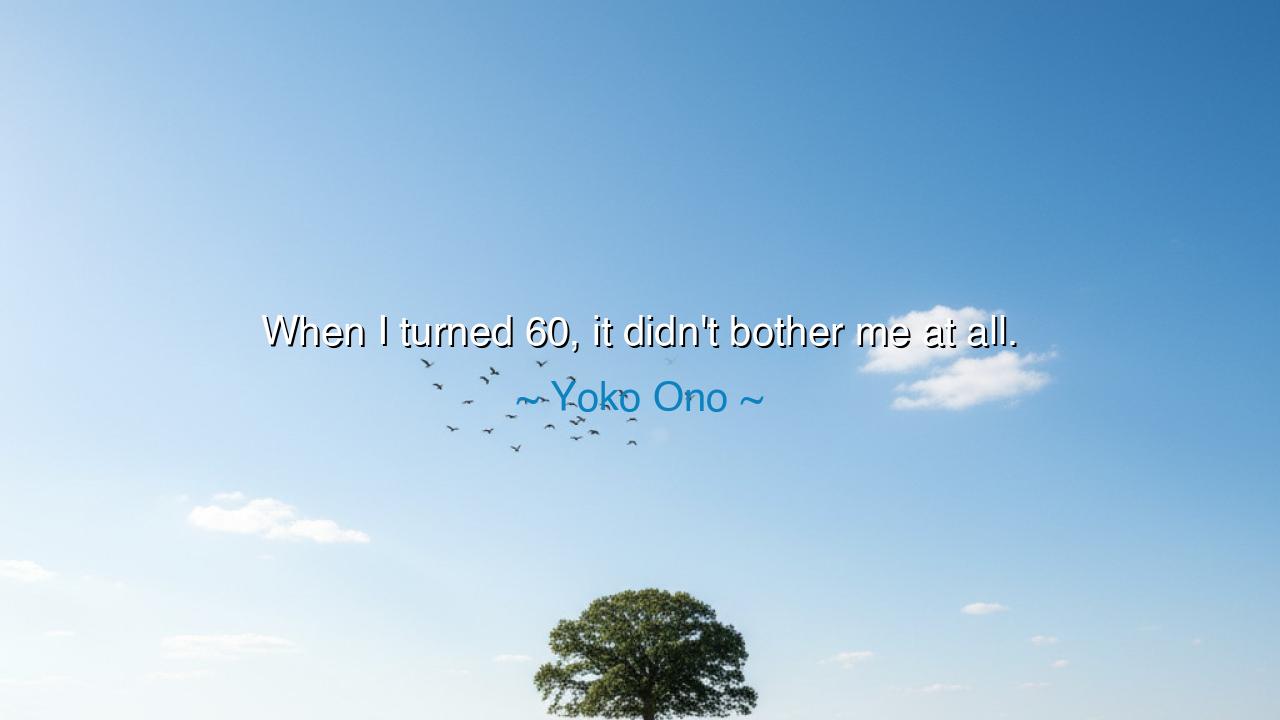
When I turned 60, it didn't bother me at all.






"When I turned 60, it didn't bother me at all." These simple yet profound words from Yoko Ono carry with them a wisdom that transcends the typical anxieties surrounding aging. In a society that often places so much emphasis on the youthful and the new, to reach the age of 60 without fear or sorrow is an act of profound self-acceptance. Ono's statement is a declaration of a mindset that embraces age, not as a loss, but as a continuation of life’s journey. In this, she reflects a deep understanding that age does not equate to decline or irrelevance, but rather to the opportunity for deeper self-expression, wisdom, and peace.
As we journey through life, there is a growing societal expectation to celebrate youth, to value beauty, strength, and vitality that often fade with time. Sixty, for many, is seen as the beginning of old age, a time when the body might show signs of wear, and the future feels shorter. Yet, Ono’s words break free from this narrow view of aging. She does not see 60 as a number that diminishes her, but as an age that carries with it the richness of experience and freedom. She shows us that acceptance of age is not merely a lack of bother, but an embrace of what has come before and what lies ahead.
Consider the example of the ancient philosophers—figures like Socrates and Aristotle—who continued to teach and debate well into their later years. Socrates, in particular, was a man whose wisdom deepened with age. Though his body grew frail, his mind remained sharp, and he found the strength to face death with clarity and peace. His life reflects a deeper understanding that age does not diminish intellect or value but can enrich them, offering insights into the human condition that only come with years of living, questioning, and reflecting. Like Socrates, Ono’s grace in aging suggests that wisdom, far from being hindered by age, is often enhanced by it.
Mahatma Gandhi, too, exemplifies this idea in his later years. As he entered old age, he continued to be a beacon of hope and wisdom for millions. His spirit was not crushed by his advancing years; instead, he found a deeper sense of purpose and clarity. Gandhi’s decision to continue to lead and inspire even in the twilight of his life shows that age is not an obstacle to contribution, but an opportunity to deepen one's influence and legacy. Gandhi’s ability to remain active and engaged in his purpose is a testament to the fact that aging can be a time of renewal rather than decline.
Ono's remark reveals a key lesson in how we view our aging process. In a world obsessed with the youthful ideal, age is often viewed through a lens of fear or regret. Many see the years that pass as a kind of loss, marking the end of potential or possibilities. But Ono, like Gandhi and Socrates, redefines 60 as a moment not of retreat, but of arrival. It is the moment when one has gained enough experience, strength, and wisdom to embrace the future without fear. It is a call to redefine aging not as a time of loss, but as a stage of life that offers the chance to live with peace and purpose, grounded in all that has come before.
The lesson from Yoko Ono’s words is that aging should not be feared but embraced. Let us learn to accept the years as they come, seeing each one not as a number that diminishes us, but as an opportunity to live more fully, wisely, and authentically. Let us turn our attention to what we have gained—the wisdom we have cultivated, the relationships we have nurtured, the contributions we have made. As Ono shows, true freedom comes when we no longer fear aging, but instead look at each year as an opportunity to become more of who we are meant to be.
In practical terms, we must take the opportunity to focus on the present, on the gifts we are given with each passing year. We must cherish our experiences, our health, and our relationships, knowing that 60, or any age, is simply a number—age is not an endpoint, but a continuation. We should not wait for a certain age to live fully; instead, we must find ways to live with purpose and joy at every stage of life. Whether in our 60s, 70s, or beyond, let us celebrate the wisdom and growth we have earned, and share it freely with the world. Age, when embraced with acceptance and peace, becomes not a burden, but a gift—a gift to ourselves and to those who follow in our footsteps.






AAdministratorAdministrator
Welcome, honored guests. Please leave a comment, we will respond soon